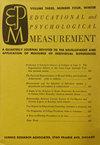再一次思考求和分数,也许是最后一次,我们不知道,哦不…:评论
IF 2.3
3区 心理学
Q2 MATHEMATICS, INTERDISCIPLINARY APPLICATIONS
引用次数: 0
摘要
总和分数和估计因子分数的相对优劣是心理学实质性研究关注的问题。最近,麦克尼什在支持估计因子得分高于总和得分的同时,对Widaman和Revelle的一篇文章提出了尖锐的反驳,这篇文章批评了麦克尼什和沃尔夫早先的一篇论文。在最近的文章中,McNeish歪曲了Widaman和Revelle的一些观点,使他对Widaman和Revelle的批评变得毫无意义。值得注意的是,McNeish选择避免面对Widaman和revelve强调的总和分数的关键优势-如果使用总和分数,则研究结果的可比性更大。相反,麦克尼什转而提出了一系列模拟研究,以确定估计因素得分的相对优势。在这里,我们回顾我们之前的主张,并在此过程中,转移McNeish的批评。我们简要讨论了与模拟数据和经验数据相关的问题,这些数据提供了每种类型得分优势的证据。在这样做的过程中,我们确定了总和分数的第二个优势:至少对于中等规模的样本,在经验数据的独立样本中,结果的交叉验证效果更好。最后,我们考虑了关于总分数和估计因子分数的四个一般问题,这些问题突出了麦克尼什和我们提供的职位之间的对比,这是在我们的领域进行应用研究时的重要问题。本文章由计算机程序翻译,如有差异,请以英文原文为准。
Thinking About Sum Scores Yet Again, Maybe the Last Time, We Don’t Know, Oh No . . .: A Comment on
The relative advantages and disadvantages of sum scores and estimated factor scores are issues of concern for substantive research in psychology. Recently, while championing estimated factor scores over sum scores, McNeish offered a trenchant rejoinder to an article by Widaman and Revelle, which had critiqued an earlier paper by McNeish and Wolf. In the recent contribution, McNeish misrepresented a number of claims by Widaman and Revelle, rendering moot his criticisms of Widaman and Revelle. Notably, McNeish chose to avoid confronting a key strength of sum scores stressed by Widaman and Revelle—the greater comparability of results across studies if sum scores are used. Instead, McNeish pivoted to present a host of simulation studies to identify relative strengths of estimated factor scores. Here, we review our prior claims and, in the process, deflect purported criticisms by McNeish. We discuss briefly issues related to simulated data and empirical data that provide evidence of strengths of each type of score. In doing so, we identified a second strength of sum scores: superior cross-validation of results across independent samples of empirical data, at least for samples of moderate size. We close with consideration of four general issues concerning sum scores and estimated factor scores that highlight the contrasts between positions offered by McNeish and by us, issues of importance when pursuing applied research in our field.
求助全文
通过发布文献求助,成功后即可免费获取论文全文。
去求助
来源期刊

Educational and Psychological Measurement
医学-数学跨学科应用
CiteScore
5.50
自引率
7.40%
发文量
49
审稿时长
6-12 weeks
期刊介绍:
Educational and Psychological Measurement (EPM) publishes referred scholarly work from all academic disciplines interested in the study of measurement theory, problems, and issues. Theoretical articles address new developments and techniques, and applied articles deal with innovation applications.
 求助内容:
求助内容: 应助结果提醒方式:
应助结果提醒方式:


